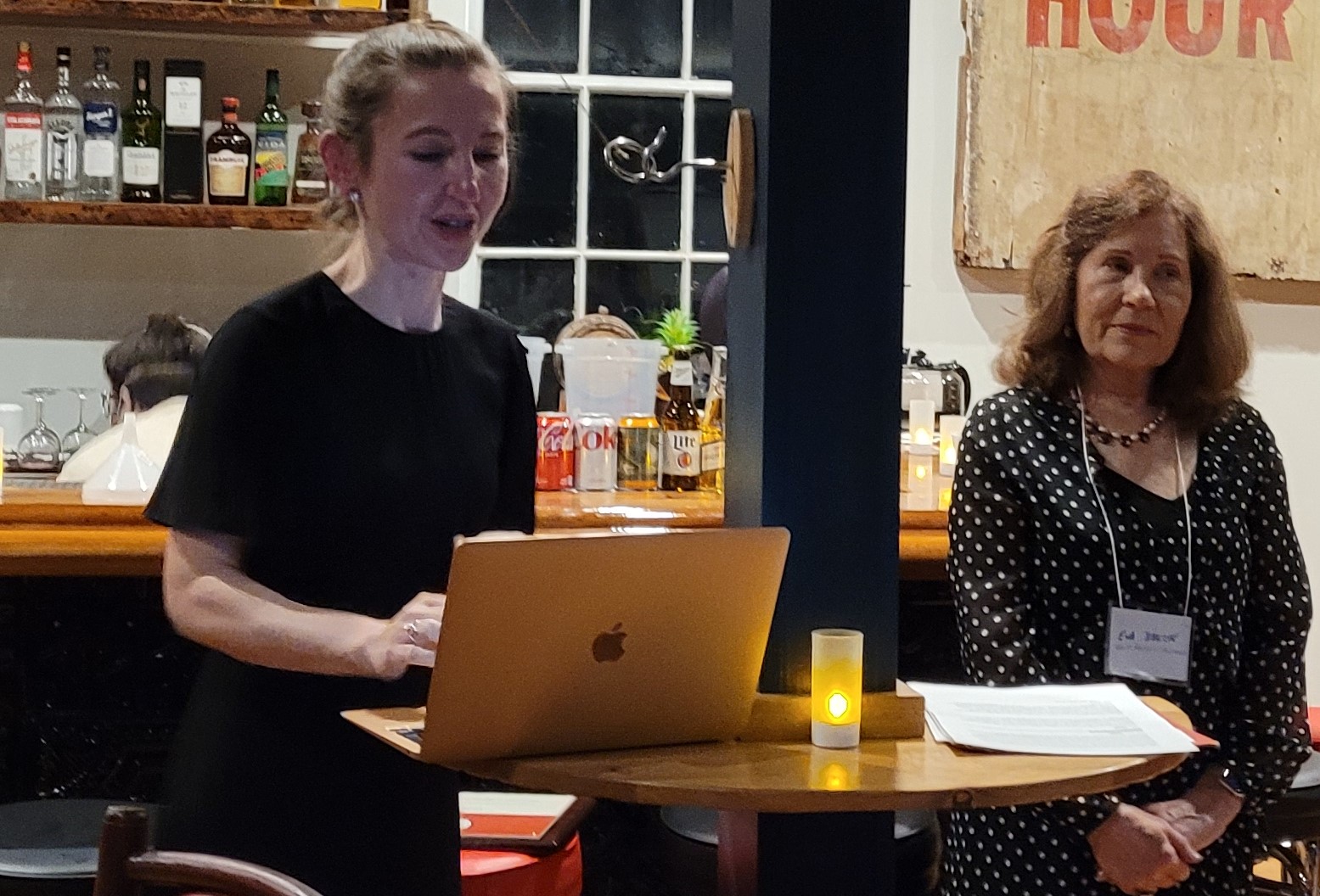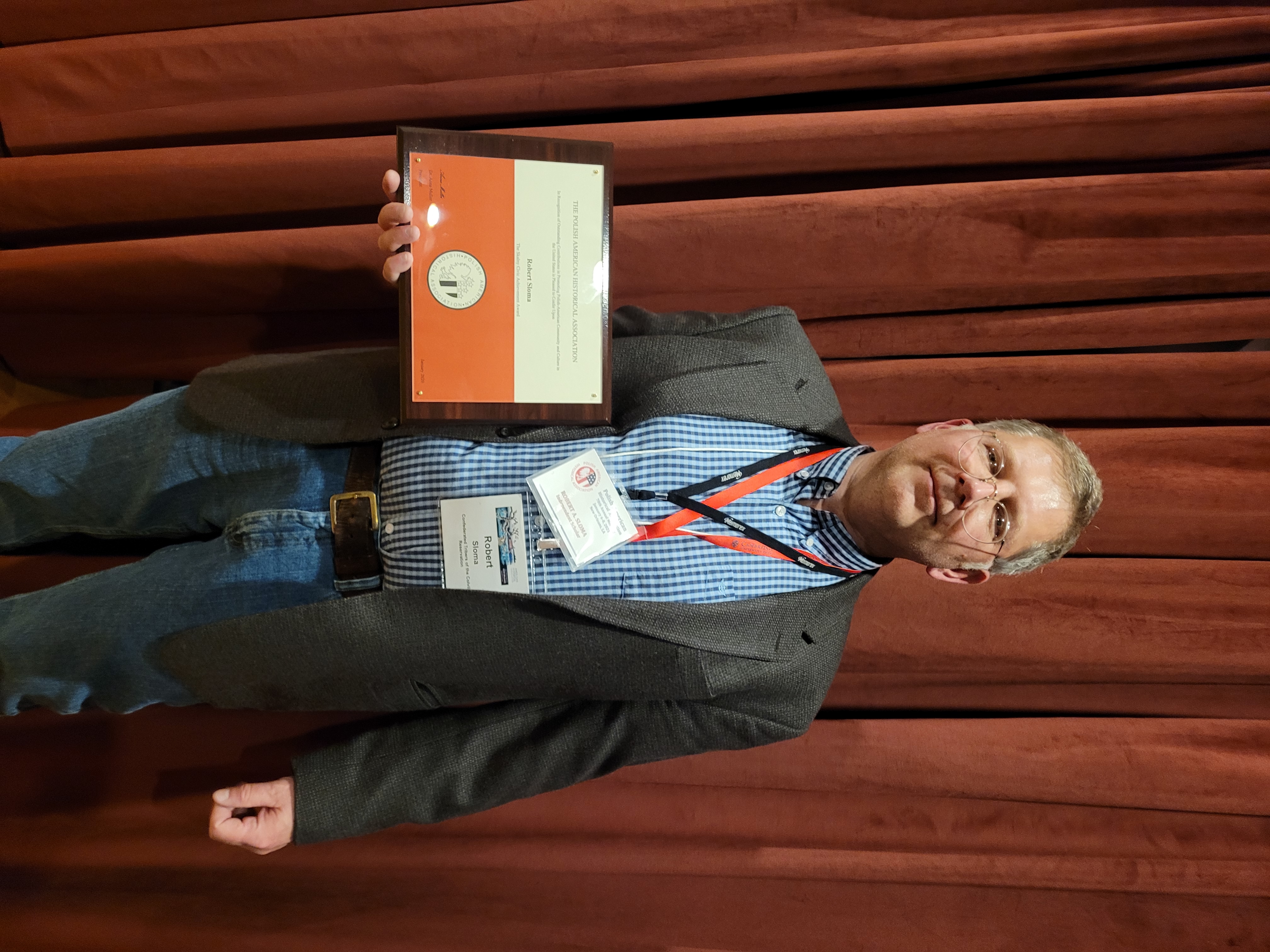The Polish American Historical Association (PAHA) is thrilled to announce the recipients of our 2020 awards and prizes. Every year, PAHA recognizes scholars, community activists, artists, long-serving PAHA members, and organizations committed to promoting all aspects of the Polish American experience. We usually celebrate our awardees during an official awards ceremony that accompanies our annual conference, which takes place every year in January. Due to the ongoing public health crisis, we have decided to cancel our conference, and thus will not have an opportunity to celebrate the 2020 awardees in person in January 2021, as we originally planned. However, we hope to be able to recognize their impressive achievements in January 2022, when we meet for our annual conference and awards ceremony in New Orleans, 2022.

Our 2020 awardees are:
Oskar Halecki Prize, which recognizes an important book or monograph on the Polish experience in the United States, goes to Dominic Pacyga’s American Warsaw: The Rise, Fall, and Rebirth of Polish Chicago (University of Chicago Press, 2019). The book is a masterful example of how the highest academic research standards can be implemented to produce a captivating and wide-ranging narrative for readers in academia and far beyond it. Pacyga’s American Warsaw is a must-read for anyone interested in migration, evolution of ethnic communities, process of acculturation in the United States, and the history of Chicago. The book “chronicles more than a century of immigration, and later emigration back to Poland, showing how the community has continually redefined what it means to be Polish in Chicago. [Pacyga] takes us from the Civil War era until today, focusing on how three major waves of immigrants, refugees, and fortune seekers shaped and then redefined the Polonia. Pacyga also traces the movement of Polish immigrants from the peasantry to the middle class and from urban working-class districts dominated by major industries to suburbia. He documents Polish Chicago’s alignments and divisions: with other Chicago ethnic groups; with the Catholic Church; with unions, politicians, and city hall; and even among its own members. And he explores the ever-shifting sense of Polskość, or ‘Polishness.’”
The Joseph Swastek Prize, which is awarded annually by the Editorial Board members of Polish American Studies for the best article published during the previous year in a given volume of Polish American Studies, goes to Joshua C. Blank for his article “Stills in the Hills: Moonshine Memories from around Canada’s First Polish Kashub Community” (vol. 76, no. 1, Spring 2019). According to the Editorial Board, Blank’s essay engages in meaningful scholarship in the area of food studies, examining the formation of ethnicity through the lens of consumption, while highlighting an understudied experience of Canadian Kashubs. The author combines anthropological and historical research to present a topic of important social and cultural consequences in the diaspora.
Skalny Civic Achievement Award honors individuals or groups who advance PAHA’s goals of promoting research and awareness of the Polish American experience and/or have made significant contributions to Polish or Polish American community and culture. This year’s Skalny goes to Robert A. Sloma. Sloma, native of Syracuse, NY, is an archaeologist by profession who also researches and writes about Polish American topics. He is currently working on a larger project on a Syracuse Police officer from the early 20th century, Janusz Korwin Bienkowski, who in addition to being a police officer, was a very gifted painter. Sloma is also the founder and an avid contributor to Spokolonia, the “Virtual Dom Polski” of Spokane’s Polish community. Spokolonia promotes and propagates topics pertinent to Polonia. In addition, Sloma organizes demonstrations of Polish gardening and cooking, both in person and online.

Amicus Poloniae Award, which recognizes significant contributions enhancing knowledge of Polish and Polish American heritage by individuals not belonging to the Polish American community, goes to Dr. Neal Pease. Pease is professor of history at the University of Wisconsin-Milwaukee, where he specializes in the history of Poland and Central Europe, Christianity (especially Catholic Church), modern Europe, and sport, particularly baseball in the United States. His 2009 book Rome’s Most Faithful Daughter: The Catholic Church and Independent Poland, 1914–1939 is a co-winner of the 2010 Association for Slavic, East European, & Eurasian Studies /Orbis Book Prize for Polish Studies. He has also published numerous articles on 20th-century Polish history, history of the Catholic church, and history of sport, including history of Polish American contributions to Americans sports. Among his numerous contributions to the field of Polish and Polish American Studies, Pease has served as Editor in Chief of The Polish Review, board member of the Polish Institute of Arts and Sciences of America, and member of the Editorial Board of Polish American Studies. He has also been a long-serving board member of the Polish American Historical Association. Pease is currently the organization’s First Vice-President and in January 2021, he will begin his term as PAHA’s President.
James Pula Distinguished Service Award is given occasionally to a member of PAHA who has rendered valuable and sustained service to the organization. This year, the award goes to Dr. Anna Mazurkiewicz. Mazurkiewicz is associate professor at the History Department at the University of Gdansk. Her areas of research and teaching expertise include the United States after World War II, US-Polish diplomatic relations, media system in the United States, US policy towards the countries of East Central Europe, political activity of refugees from East Central Europe in the United States after World War II, and political emigration from East Central Europe in 1945-1989. She has been a long-serving member of PAHA and in the years 2017-2018 served as the organization’s President. Although Mazurkiewicz is an accomplished researcher and university educator, this award recognizes her truly exceptional service for PAHA. In the words of one PAHA member who nominated her for the award, “Ania has been a mainstay of PAHA for many years, organizing conferences, including the eminently successful 75th anniversary celebration in Chicago, serving as Polish American Studies book review editor for Poland, obtaining grants to support PAHA activities, and promoting the organization to potential new members. In addition to her direct activities in PAHA, she has also supported the organization by arranging co-sponsorships and other public relations exposure, arranging for PAHA members to be invited to and attend international conferences, and editing for the publication of the excellent volumes that came from one of her Gdansk conferences and featured several PAHA participants.”
Creative Arts Prize recognizes the contributions in the field of creative arts by individuals or groups who have promoted an awareness of the Polish experience in the Americas. We are thrilled to award two Creative Arts Prizes in 2020, one to author and educator Leslie Pietrzyk and one to PRCUA Gwiazda Dancers.
Leslie Pietrzyk is a writer and teacher of creative writing. Two of her novels, Pears on a Willow Tree and Reversing the River, deal with the Polish experience in America and explore what it means to be Polish or Polish American in the United States. She has also published novels Silver Girl and A Year and a Day as well as a collection of related short stories, This Angel on My Chest. Her short fiction has appeared in The Gettysburg Review, The Iowa Review, New England Review, The Sun, TriQuarterly, and Shenandoah. She holds a B.A. in English/Creative Writing from Northwestern University and an M.F.A. in Creative Writing from American University. She lives in Alexandria, Virginia, and teaches in the Masters in Writing program at Johns Hopkins University, as well as the Low-Res MFA at Converse College.
PRCUA Gwiazda Dancers was founded in 1960 and is based in Hamtramck, Michigan. The Gwiazda Dancers strive to promote and preserve Polish folk culture through song and dance in the Metro-Detroit area. In addition to their folk performances (the group gave over 30 performances in 2019), the group seeks to enrich its community through volunteer events throughout the year. These events include, the Empty Bowls Project with Cass Community Social Services, the Give Thanks Event with the Boll Family YMCA, and various outreach programs to aging and disabled veterans in conjunction with the Polish Legion of American Veterans. The director, choreographer, officers, dancers, and their families consistently work to promote Polish folk culture, the Polish experience, and the city of Hamtramck in all of their undertakings.